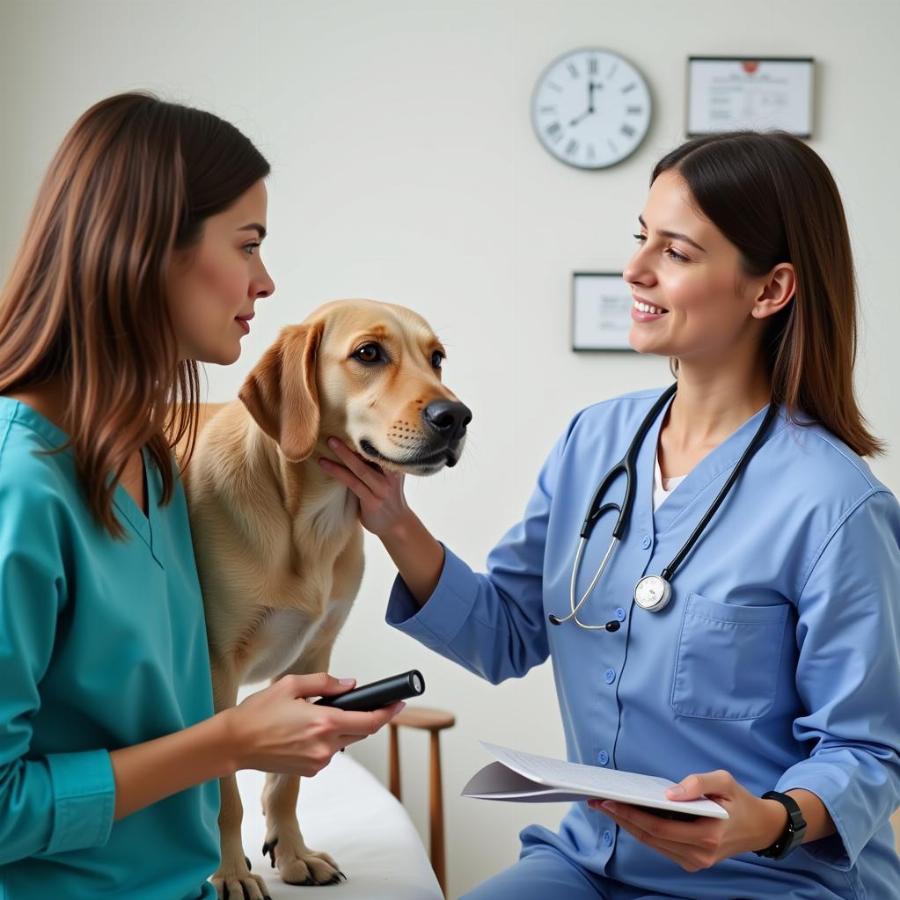T relief for dogs encompasses a variety of methods and medications aimed at easing anxiety, stress, and fear in our furry friends. Whether your dog experiences occasional nervousness or suffers from a more severe anxiety disorder, understanding the available options for t relief can significantly improve their quality of life. This article will explore the different approaches to calming anxious dogs, from natural remedies to prescription medications, empowering you to make informed decisions for your beloved pet.
Understanding Canine Anxiety
Just like humans, dogs can experience anxiety, which manifests in various ways, including excessive barking, destructive behavior, panting, pacing, and even aggression. Identifying the root cause of your dog’s anxiety is crucial for effective treatment. Common triggers include loud noises (thunderstorms, fireworks), separation from their owners, changes in routine, new environments, and encounters with unfamiliar people or animals.
Natural T Relief for Dogs
Many dog owners prefer to start with natural t relief methods before considering medication. These options can be surprisingly effective for mild to moderate anxiety and may also complement prescribed treatments.
- Calming Supplements: These often contain ingredients like chamomile, L-theanine, melatonin, or CBD, which can promote relaxation and reduce stress. Always consult with your veterinarian before giving your dog any supplements, especially if they are on other medications.
- Pheromone Diffusers: These devices release synthetic versions of dog-appeasing pheromones, mimicking the natural calming scents mother dogs produce. They can create a sense of security and comfort for anxious dogs.
- Anxiety Wraps: These snug-fitting garments apply gentle, constant pressure to the dog’s body, similar to a hug, which can have a calming effect.
- Behavioral Training: Working with a certified dog trainer or behaviorist can help address underlying anxiety issues. Techniques like desensitization and counter-conditioning can gradually acclimate your dog to anxiety-provoking stimuli.
Prescription Medication for Dog Anxiety
For more severe anxiety cases, your veterinarian may recommend prescription medication. These medications should only be used under veterinary supervision and are tailored to the individual dog’s needs.
- Anti-anxiety Medications: These drugs, such as alprazolam or clomipramine, can help reduce anxiety and promote calmness. They can be used for situational anxiety, like during thunderstorms or vet visits, or for long-term management of anxiety disorders.
- SSRIs (Selective Serotonin Reuptake Inhibitors): These medications, like fluoxetine or sertraline, are often used for chronic anxiety and can help regulate serotonin levels in the brain, promoting a more balanced mood.
 Veterinarian Examining an Anxious Dog Before Prescribing Medication
Veterinarian Examining an Anxious Dog Before Prescribing Medication
Creating a Calming Environment
Regardless of the chosen t relief method, creating a calming environment for your dog is essential. This can involve:
- Safe Space: Provide a quiet, comfortable den or crate where your dog can retreat when feeling overwhelmed.
- Regular Exercise: Physical activity helps release endorphins, which have mood-boosting effects.
- Mental Stimulation: Engage your dog in activities like puzzle toys or training sessions to keep them mentally stimulated and reduce boredom, which can contribute to anxiety.
- Consistent Routine: Maintaining a predictable daily routine can provide a sense of security for anxious dogs.
What if My Dog’s Anxiety is Severe?
If you’ve tried various t relief methods and your dog’s anxiety remains severe, it’s crucial to consult with a veterinary behaviorist. They can conduct a thorough assessment and develop a tailored treatment plan, which may involve a combination of medication, behavior modification, and environmental adjustments.
Conclusion: Providing T Relief and Enhancing Your Dog’s Well-being
Finding the right t relief for your dog can significantly improve their quality of life. By understanding the causes of anxiety and exploring the various available options, from natural remedies to prescription medications and behavioral training, you can help your furry friend feel more comfortable, secure, and happy. Don’t hesitate to seek professional guidance from your veterinarian or a veterinary behaviorist for personalized advice and support.
FAQ: Common Questions about T Relief for Dogs
- Can I give my dog human anxiety medication? No, never give your dog human medication without consulting your veterinarian. Human medications can be extremely dangerous and even fatal to dogs.
- How long does it take for anxiety medication to work in dogs? The onset of effects can vary depending on the medication and the individual dog. Some medications may take several weeks to reach full effectiveness.
- Are there any side effects of anxiety medication for dogs? Like any medication, anxiety medications can have potential side effects. Your veterinarian will discuss these with you and monitor your dog for any adverse reactions.
- What is the best natural remedy for dog anxiety? The effectiveness of natural remedies varies depending on the dog and the severity of their anxiety. It’s best to discuss natural options with your veterinarian.
- How can I help my dog during a thunderstorm? Create a safe and comfortable space for your dog, play calming music, and try to distract them with toys or treats.
For more information on joint relief for dogs, please visit our article on joint relief for dogs. You might also be interested in learning more about specific medications such as galliprant for dogs. If you’re considering alternative medications, be sure to check out our article on apoquel for dogs alternative. For detailed information on Librela, you can download our librela for dogs brochure pdf. Finally, for information on medications for human anxiety and their potential impact on dogs, please see our article on can dogs take xanax.
Beaut Dogs is your trusted source for comprehensive and reliable information on the world of canine companions. We offer expert advice on various aspects of dog ownership, from breed selection to health, nutrition, and training. When you need expert guidance, reach out to us at [email protected] for detailed and accurate answers.